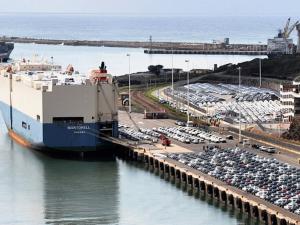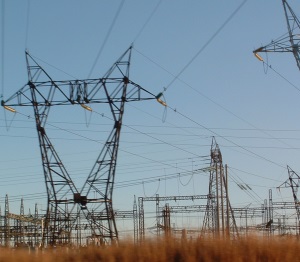Review of the regulation in the ports, electricity supply industry and renewable industry –
Project: Regulatory Entities Capacity Building: Review of Regulators Orientation and Performance
Client: Centre for Competition, Regulation and Economic Development, University of Johannesburg
Duration: 2013-2014 - to be completed by March 2014
Effective performance by economic regulators is important for growth and development. In recognition of the importance of their role, the Economic Development Department has commissioned the Centre for Competition, Regulation and Economic Development to undertake a research and capacity building project for economic regulators in South Africa. The Regulatory Entities Capacity Building Project involves a review of the performance of the economic regulators as well as identifying the constraints impacting their performance. The University of Johannesburg aims to use the information from the reviews to create customised training course in regulatory economics for both employees of the economic regulators in South Africa and for students.
TIPS is undertaking reviews of the following sectors as part of the project:
The emphasis of these reviews on understanding the issues at a practical level, looking at how the regulator has been able to address the challenges it has faced, and how it can be assisted to improve, including from learning from other regulators.
Review of Regulation in the Ports Section
Review of Regulation in the Electricity Supply Industry
Review of Regulation in Renewable Energy
Ports
 The South African Ports Regulator, established in terms of the National Ports Act 12 of 2005 is a relatively new institution. Time taken to establish the institution has meant it has only recently begun to be effective. Over the past three years it has flexed its regulatory muscle with significant revisions to the tariff book and pricing proposed by the National Ports Authority. Studies have been conducted on the tariff adjustments and the stakeholder submissions to the Ports Regulator. However, limited work has been done on the effectiveness of the regulator.
The South African Ports Regulator, established in terms of the National Ports Act 12 of 2005 is a relatively new institution. Time taken to establish the institution has meant it has only recently begun to be effective. Over the past three years it has flexed its regulatory muscle with significant revisions to the tariff book and pricing proposed by the National Ports Authority. Studies have been conducted on the tariff adjustments and the stakeholder submissions to the Ports Regulator. However, limited work has been done on the effectiveness of the regulator.
TIPS’s assessment the regulation of ports in South Africa includes:
- Reviewing the role of the regulator, linking this to the broad policy framework and economic development priorities of the government.
- Assessing the work of the regulator, including through looking at case studies of ports regulation in other jurisdictions.
- Considering the role of the regulator in contributing to the efficient and cost-effective operation of the ports, including the impact of the ports on the broader economy.
- Considering the role of ports in attracting investment and supporting the growth of service sectors related to port operations such as ship repair, boat building and servicing the offshore oil and gas sector.
- Considering the regulator looking at more than pricing, and going broader into the terms of access and quality of service of South African ports.
- Looking at international experiences in Australia, India and South America.
Resources
Review of Regulation in the Ports Section
Electricity Sector
 The National Energy Regulator of South Africa (NERSA) is the regulatory authority established in terms of the National Energy Regulator Act, 2004.
The National Energy Regulator of South Africa (NERSA) is the regulatory authority established in terms of the National Energy Regulator Act, 2004.
The Regulatory Entities Capacity Building project will provide a comprehensive review of the regulators' role, linked with the policy framework and powers.
The review includes:
- Examining the linkages with economic development in a number of areas including links with industrial policy.
- Assessing the key issues at each level of the Electricity Supply Industry value chain.
- Examining electricity pricing and the process of setting prices by NERSA.
- Evaluating the regulatory and institutional framework.
- Looking at the role of Independent Power Producers and municipalities.
- Undertaking case studies that highlight how actions by Eskom and the regulator have implications for industrial policy.
- Identifying specific areas of capacity building to inform short learning programmes (SLPs).
Resources
Review of Regulation in the Electricity Supply Industry
Renewable Energy Sector
 The Renewable Energy Independent Power Producer Programme (REIPPP) was established to encourage new entry into the market.
The Renewable Energy Independent Power Producer Programme (REIPPP) was established to encourage new entry into the market.
The Regulatory Entities Capacity Building project review of the renewable energy sector includes:
- Assessing the problems and difficulties in implementing South Africa's first option for the expansion of renewable energy through feed-in tariffs (REFITs), initiated by the Department of Energy, and its abandonment by the government.
- Assessing, with the assistance of the National Treasury's Public-Private Partnership Unit, the motivations for opting to pursue competitive bids tenders through the REIPPP instead of the REFIT system.
- Assessing the outcomes of the competitive bidding process as a regulatory mechanism with reference to its impact on market entry, expansion of capacity, investment, pricing and linkages to industrial policy and job creation.
- Explore NESRA's role in this process.
Resources
Review of Regulation in Renewable Energy




 The South African Ports Regulator, established in terms of the National Ports Act 12 of 2005 is a relatively new institution. Time taken to establish the institution has meant it has only recently begun to be effective. Over the past three years it has flexed its regulatory muscle with significant revisions to the tariff book and pricing proposed by the National Ports Authority. Studies have been conducted on the tariff adjustments and the stakeholder submissions to the Ports Regulator. However, limited work has been done on the effectiveness of the regulator.
The South African Ports Regulator, established in terms of the National Ports Act 12 of 2005 is a relatively new institution. Time taken to establish the institution has meant it has only recently begun to be effective. Over the past three years it has flexed its regulatory muscle with significant revisions to the tariff book and pricing proposed by the National Ports Authority. Studies have been conducted on the tariff adjustments and the stakeholder submissions to the Ports Regulator. However, limited work has been done on the effectiveness of the regulator. The
The  The Renewable Energy Independent Power Producer Programme (REIPPP) was established to encourage new entry into the market.
The Renewable Energy Independent Power Producer Programme (REIPPP) was established to encourage new entry into the market.









